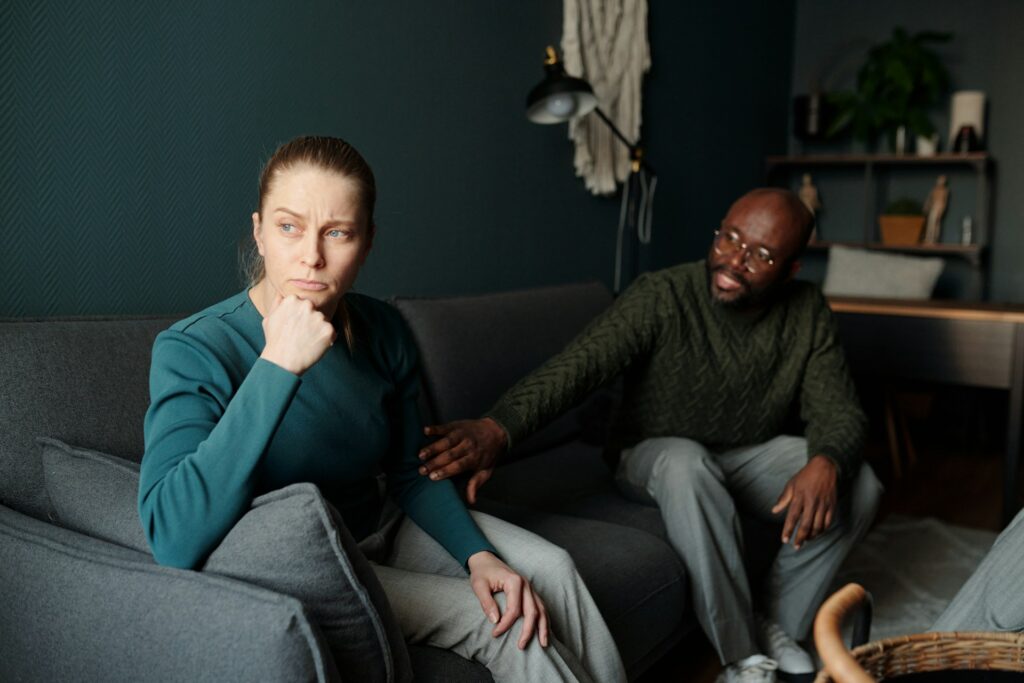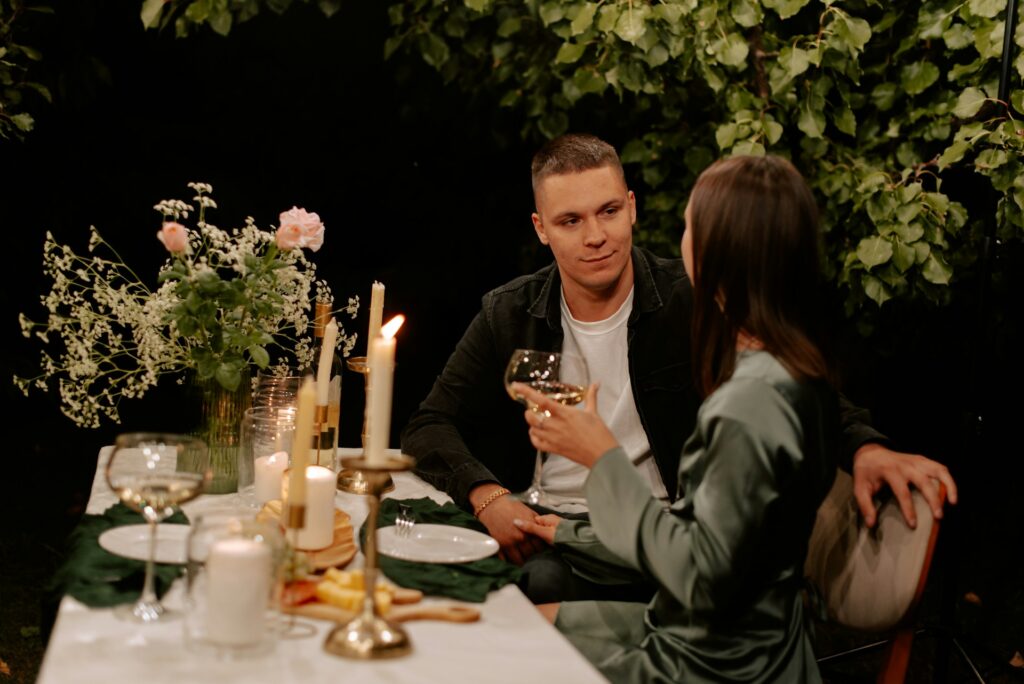Not every problem in a relationship results in fireworks.

Sometimes it’s just a vague feeling, a hesitation you can’t explain. Maybe you (or they) pause before saying “I love you,” or a weird sense of unease when you’re alone together. These quiet doubts are easy to dismiss. You tell yourself you’re overthinking, or that all couples go through phases.
However, those little mental nudges are often trying to tell you something. They don’t always mean it’s over, but they usually mean something important is being overlooked. Here are some subtle doubts that can actually have more of an effect on your overall connection than you might assume.
1. You find yourself rehearsing conversations before having them.

If you need to mentally rehearse what you’re going to say, even for small things, it usually means you’re bracing for a reaction. That kind of constant emotional calculation isn’t sustainable. It often points to a dynamic where honesty feels risky, or where emotional safety is lacking. In a healthy relationship, you shouldn’t have to plan every word like you’re walking a tightrope.
2. You feel lonelier with them than without them.

Loneliness in a relationship hits differently. It’s not just about being alone; it’s about feeling unseen while physically beside someone who’s meant to know you best. Sadly, this usually points to emotional disconnection. Maybe communication has dried up, or one of you has mentally checked out. Either way, the silence starts feeling heavier than actual solitude.
3. You keep telling yourself that “it’s not that bad.”

When you find yourself repeatedly downplaying your own discomfort, there’s usually a reason. Saying “it could be worse” is often a way of convincing yourself to stay in something that already doesn’t feel good. That sort of internal bargaining often masks unmet needs or boundaries being crossed, even if you haven’t fully admitted it yet.
4. You feel relieved when they’re not around.

If your nervous system relaxes when they leave the room—and not in a casual “me time” way—it’s worth noticing. That change in energy says a lot about how the relationship affects your emotional state. Relief shouldn’t be the dominant emotion when your partner’s away. If it is, something deeper is probably draining you when you’re together.
5. You’re constantly hoping they’ll change.

We all have things we wish our partners would work on. However, when your peace of mind relies on them becoming someone else entirely, it might be a sign you’re already mourning who they’re not. Wishing, waiting, and hoping for change can slowly turn into resentment. That’s especially true if they don’t even see an issue with the things that are bothering you.
6. You’re not excited to share your good news.

If you’ve started going to friends or coworkers first when something good happens, that’s a quiet sign of emotional drift. Your partner should be one of your safe spaces for celebration, not an afterthought. Sometimes this happens because you’re afraid they’ll downplay it, make it about themselves, or just not really care. That kind of consistent flatness in response starts to wear you down.
7. You don’t feel understood, even when you try to explain.

It’s exhausting to pour your heart out only to feel like the other person didn’t really hear you. If you’ve explained how you feel multiple times and still feel emotionally missed, it builds doubt. Misunderstandings happen, but if feeling unheard becomes the norm, your doubt may be pointing to an emotional mismatch, not just bad communication.
8. You daydream about being single again.

It’s one thing to reminisce about your independent years. It’s another to fantasise about walking away and feeling free. Those thoughts can creep in when your emotional needs aren’t being met anymore. That doesn’t automatically mean the relationship is doomed, but it does mean something about the current dynamic isn’t fulfilling you. That deserves attention, not shame.
9. You’re afraid of how they’ll react to feedback.

Whether it’s about a bad habit or something deeper, feeling anxious about bringing up issues is a red flag. Relationships need room for honest feedback without emotional backlash or shutdown. When fear of their reaction starts guiding your silence, trust begins to fade. That silence doesn’t protect the relationship; it just slowly suffocates it.
10. You feel like you’re performing the role of a partner.

You’re smiling, checking in, going through the motions, but it doesn’t feel natural anymore. If being in the relationship starts to feel like playing a part rather than being yourself, that’s a big indicator that something’s off. You might not know what changed or when it happened, but the disconnection tends to start small, and pretending only widens the gap.
11. You’re hyper-aware of other couples who seem genuinely happy.

It’s not envy exactly, but you find yourself noticing the warmth and ease other couples seem to share. It makes you realise that yours feels different—heavier, quieter, or more strained. That comparison doesn’t mean your relationship is bad, but it’s often a subconscious way of acknowledging what you’re missing. It’s not about wanting someone else’s love story; it’s about wanting more from your own.
12. You hesitate to plan too far ahead.

When the thought of booking a trip, moving in, or even making weekend plans brings up weird tension instead of excitement, that’s a sign of hesitation beneath the surface. Doubt often shows up in your future vision first. If something in you resists locking in plans, it might be your intuition quietly stepping in with a pause.
13. You feel emotionally self-sufficient in the relationship.

Being independent is great, but being in a relationship where you don’t feel emotionally supported at all is something else entirely. If you’re constantly turning inward to manage everything yourself, you may not be getting the care you need. It often develops when vulnerability hasn’t felt safe, or when past attempts to connect were brushed off. Over time, it becomes easier to just not bother, but that takes a toll.
14. You don’t like who you are around them anymore.

Maybe you’ve become more guarded, more reactive, or more insecure, and you don’t recognise that version of yourself. Sometimes it’s not just the relationship that’s changed, it’s what it’s bringing out in you. If you’re constantly self-monitoring or feeling small, it might be your body reacting to emotional pressure, not just personal stress. Those small changes in identity often say more than the big fights ever do.
15. You keep asking yourself if you’re just being too picky.

This is one of the most common ways people gaslight themselves. If you’re repeatedly questioning whether your needs are valid, it’s usually because they’ve been ignored or minimised for too long. Your doubts aren’t drama. They’re messages. And while not every relationship can or should be perfect, your comfort, safety, and emotional clarity should never feel negotiable.


